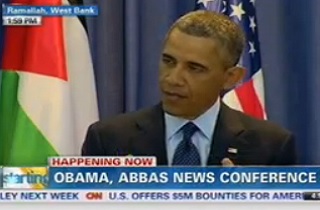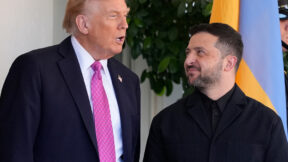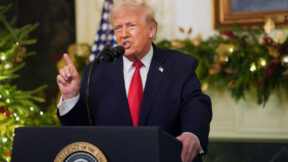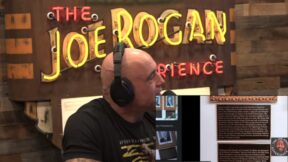President Obama Repeatedly Pressed About Settlements In Joint West Bank Press Conference
 On Thursday afternoon in Ramallah, on the West Bank, President Obama followed his speech at a joint press conference with Palestinian Authority President Mahmoud Abbas by answering questions from one local reporter, and from CBS News Senior White House Correspondent Major Garrett. Both asked about Israeli settlement activity, which the President didn’t discuss publicly during his time with Israeli Prime Minister Benjamin Netanyahu. The President skillfully evaded saying whether he’d discussed the issue with Netanyahu, but divulged a little more upon Garrett’s re-direct.
On Thursday afternoon in Ramallah, on the West Bank, President Obama followed his speech at a joint press conference with Palestinian Authority President Mahmoud Abbas by answering questions from one local reporter, and from CBS News Senior White House Correspondent Major Garrett. Both asked about Israeli settlement activity, which the President didn’t discuss publicly during his time with Israeli Prime Minister Benjamin Netanyahu. The President skillfully evaded saying whether he’d discussed the issue with Netanyahu, but divulged a little more upon Garrett’s re-direct.
President Obama was first asked if he thought that a two-state solution was still valid, given the expansion of settlements, and more specifically, if he had raised the issue of freezing settlements with PM Netanyahu when they met.
“Based on the conversations I’ve had with Prime Minister Netanyahu and President Abbas, I do think the possibility continues to exist for a two-state solution,” President Obama began, before pivoting away from the tightý-focused questions.
“One of the striking things, one of the ironies of this conflict,” the President continued, is that both the Israeli people and the Palestinian people are extremely entrepreneurial. Yhey have a keen business sense. They could be hugely successful in helping to lift up the economy of the region as a whole.”
He continued to talk about common ground for a few minutes, before returning to the settlement issue, while carefully avoiding the content of his recent conversations with Netanyahu. “Now, one of the challenges,” President Obama said, “is continued settlement activity in the West Bank area, and I am clear with Prime Minister Netanyahu and other Israeli leadership. It has been the United States’ policy, not just for my administration, but for all preceding administrations, that we don’t consider settlement activity to be constructive, to be appropriate, to be something that can advance the cause of peace. I don’t think there is any confusion in terms of what our position is.”
The President pointed out that “if the expectation is that we can only have direct negotiations when everything is settled ahead of time, then there is no point to negotiations,” and reiterated the concerns of both sides, weighing settlements against rocket attacks. “Israelis have concerns about rockets flying into their city last night,” Obama said, “and it would be easy for them to say this is why we can’t have peace, because we can’t afford to have our kids sleeping in bed and suddenly a rocket comes through the roof. My argument, even though both sides may have areas of strong disagreement, may be engaging in activities with the other side considers to be a breach, we have to push through those things to try to get to an agreement.”
Major Garrett then asked the President “What would you say here in Ramallah, to those entrepreneurial Palestinians, who believe have you been equivocal or nonresponsive to the issue of settlements (in particular, the E-1 settlement)?”
“Major, I think I answered the question previously about settlements,” the President replied. “You mentioned E-1 in particular. I think that is a an example of a — at least a public statement by the Israeli government that would be very difficult to square with a two-state solution. I’ve said that to President Netanyahu. I don’t think that’s a secret.”
He then reiterated much of his previous answer, that settling issues before negotiations can begin is self-defeating. “The core issues right now,” President Obama said, “how do we get sovereignty for the Palestinian people, and how do we get security for the Israeli people? That’s the essence of this negotiation, and that’s not to say settlements are not important. It is to say that if we solve those two problems, the settlement problem will be solved. I don’t want to put the cart before the horse.”
The President added that “incremental steps have served to delay and put off some of the more fundamental issues,” and that it’s “not clear that (incremental steps) would, in fact, build trust. if you have a situation where it looks like the incremental steps replaced the broader vision. as opposed to incremental steps in pursuit of a broader vision, then I think what you end up getting is four more years, ten more years, 20 more years, of conflict and tension, on which both sides are, you know, testing the boundaries of those incremental agreements. Whereas if we can get a broad based agreement that assures Palestinians they have a stake, and you have a comprehensive approach that Israel has the kind of security they need, the likelihood of that deal holding, and ultimately the sense of trust that comes from people to people relations, not just governmental relations, that’s much more likely to hold.”
Here’s video of President Obama’s answer to the first question, followed by Major Garrett’s follow-up, from CNN:
Major Garrett:




Comments
↓ Scroll down for comments ↓